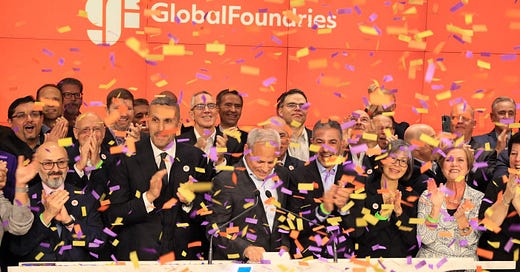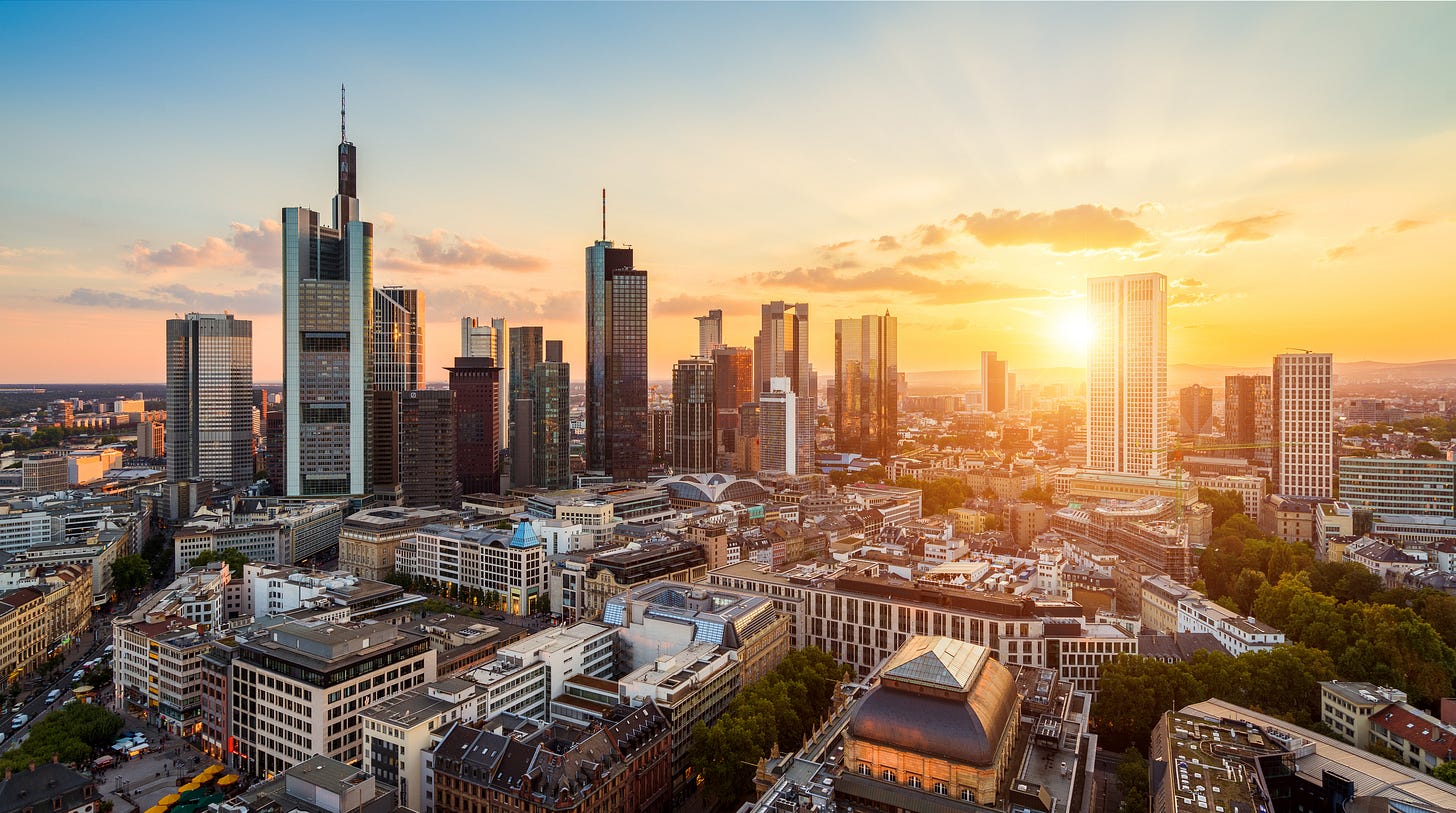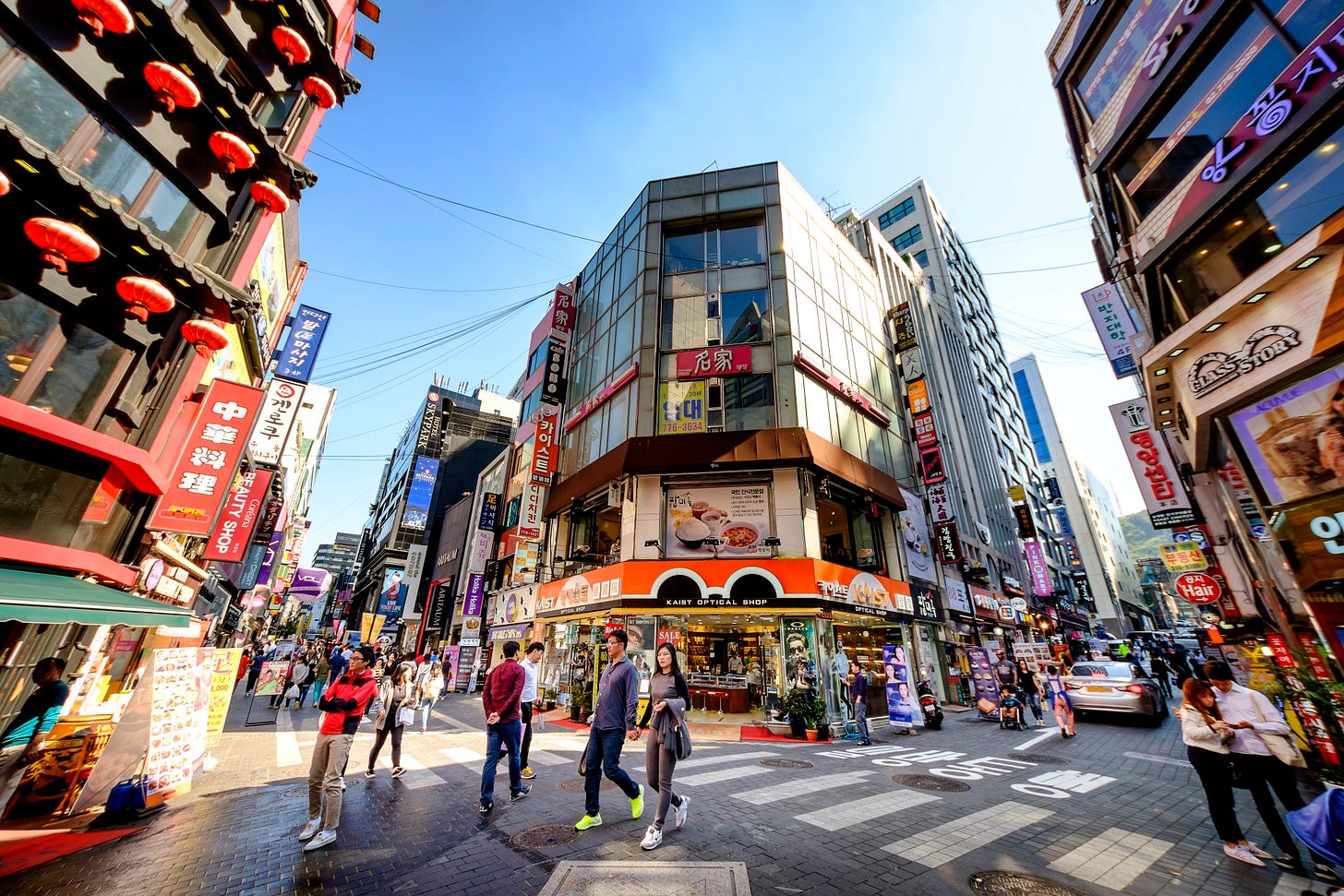Emerging Markets Daily - October 29
Global Foundries in $2.6B IPO, Volvo Cars IPO, Eurozone Economy Rising, Communal Violence Flares in India-Bangladesh Border, S. Korea and India Bonds Selloff?
The Top 5 Stories Shaping Emerging Markets from Global Media - October 29
Mubadala-Owned Global Foundries Raises $2.6 B in Nasdaq IPO
The National and MarketWatch
“GlobalFoundries, the world’s third-largest semiconductor manufacturer owned by Abu Dhabi’s Mubadala Investment Company, raised nearly $2.6 billion in its initial public offering in the US amid strong demand from investors.”
“The New York-headquartered company set the IPO price at $47 per share, at the higher end of its targeted price range after marketing the shares for $42 to $47. This gives the company a market value of nearly $26 billion.”
“The company's shares began trading on the Nasdaq Global Select Market on Thursday under the ticker symbol ‘GFS’…”
“GlobalFoundries was established in 2009 after Mubadala acquired the semiconductor manufacturing assets of Advanced Micro Devices. After the acquisition, GlobalFoundries started making chips for other companies in addition to AMD.”
“In October 2014, GlobalFoundries acquired International Business Machines’ microelectronics division with manufacturing facilities in New York and Vermont, in a deal which added to its global footprint.” Alkesh Sharma reports.
“Meanwhile, MarketWatch reports that ‘At 11:51 a.m. Eastern (October 28), GlobalFoundries GFS, -1.28% shares dropped as much as 5% and later touched an intraday low of $44.48, before closing down 1.3% at $46.40 for a market valuation of $24.81 billion. Late Wednesday, the Malta, N.Y.-headquartered company priced shares at $47 apiece, the top end of its forecast range.’”
“Thomas Caulfield, GlobalFoundries chief executive, told MarketWatch in an interview that the decision to go public now had a lot to do with building out capacity. ‘We have to accelerate our capacity to meet our customers need. A lot of our demand is single-source, so customers are counting on us,” Caulfield told MarketWatch… ‘We are not demand-limited on our revenue, we are capacity-limited,’ Caulfield said.”
China’s Geely-Owned Volvo Shares Jump More than a Fifth on IPO
Financial Times
“Shares in Volvo Cars rose more than fifth as the Chinese-owned premium carmaker made its stock market debut after a lengthy and potholed journey to being listed.”
“Volvo’s Chinese owner Zhejiang Geely, which will still own about four-fifths of the carmaker, was forced last week to convert its vote-heavy shares into normal stock after protests from potential Swedish investors.”
“The scaled-back initial public offering, a previous attempt at which was cancelled in 2018 owing to trade tensions between the US, Europe and China, had been priced at the lower end of its range.”
“Volvo’s shares rose from their offer price of SKr53 to SKr64.73 in midday trading in Stockholm on Friday, an increase of 22.1 per cent. The carmaker will raise SKr20bn ($2.4bn), which could climb to SKr23bn if an overallotment option is exercised in full, which it is planning to use mostly to fund its push into electric vehicles as part of its pledge to stop selling petrol-fuelled cars by 2030.” Richard Milne reports.
Eurozone Economy Outpaces U.S and China, but Tougher Times Ahead
Wall Street Journal
“The eurozone economy grew briskly in the summer, outpacing the larger U.S. and Chinese economies as the loosening of social restrictions and widespread vaccinations powered the region’s comeback from the Covid-19 pandemic, but supply-chain bottlenecks and rising prices are expected to hold growth back in the coming months.”
“Gross domestic product in the 19-nation eurozone grew at a seasonally adjusted annualized rate of 9.1% in the three months through September, roughly in line with the previous quarter, the European Union’s statistics agency said on Friday.”
“That is significantly faster than the 2% annual growth rate clocked by the U.S. economy and roughly 1% for China’s economy over the same period. Europe is climbing out of a deeper economic hole and hasn’t yet returned to its pre-pandemic level of output, unlike the larger U.S. and Chinese economies.”
“While the U.S. economy is expected to accelerate over the coming months, analysts say eurozone growth is likely to falter, hit by the world-wide supply-chain bottlenecks that are choking off the expansion in many countries.” Tom Fairless reports.
Hindu, Muslim Violence Flares Along Bangladesh and India Border
Washington Post
“Attacks against religious minorities are flaring up on both sides of a porous, hilly border separating India and Bangladesh, raising the prospect of swelling violence between Hindus and Muslims after Bangladesh was rocked by one of its worst bouts of communal strife in years.”
“In Panisagar town in Tripura, a remote Indian state hugging the Bangladesh border, more than 3,000 Hindu activists held a protest Tuesday night that quickly erupted into violence, said Soubik Dey, a local police official. A mosque and several homes were attacked, forcing Muslim residents to flee. Dey said that no deaths were reported and that the town is now ‘under control’ with a heavy police presence.”
“Muslim leaders in Tripura say the Tuesday rally was the latest in a string of revenge attacks targeting their community this month in response to events in Bangladesh, where Muslims have targeted Hindus, who make up a tenth of the population.”
“After an Oct. 13 post spread on social media claiming Hindus were desecrating the Koran, a Muslim mob attacked the small Hindu community in the town of Cumilla as it celebrated the Durga Puja, a major religious festival. At least seven people, including two Hindus, died in the ensuing chaos that engulfed several cities across Bangladesh, prompting condemnation from Indian officials and appeals for unity from Bangladesh’s leader, Prime Minister Sheikh Hasina.”
“The fresh violence now spilling into India is yet another reminder of the internal divisions that haunt South Asia more than seven decades after the region’s borders were drawn along religious lines.” Gerry Shih and Taniya Dutta report.
Bond Selloff Headed for South Korea and India
Bloomberg
“Bond markets in South Korea and India are the most vulnerable to a sell-off in the region’s emerging markets, even if they’re typically at opposite ends of the investment spectrum.”
“Inflation in these two nations -- one a tech exporter and the other a services and agriculture-driven economy -- is heavily influenced by rising energy prices given how much they import. Their bonds also have a higher sensitivity to U.S. inflation breakevens than others, according to data compiled by Bloomberg News.”
“Rising price pressures have led to a rout in the debt markets of Australia and New Zealand this month, and traders are increasingly betting that entrenched inflation will spur central banks globally to turn more hawkish. The Bank of Korea has already hiked 25 basis points, while India this month said it will stop a government bond purchase program.”
“Risks to the bonds are coming from two fronts, ‘namely the actual domestic inflation risk that seeps through via import channels, and how emerging-Asia bond markets navigate rising Treasury yields,’ according to Vishnu Varathan, head of economics and strategy at Mizuho Bank Ltd. in Singapore. Marcus Wong reports.
“It does not matter how slowly you go as long as you do not stop.” – Confucius





